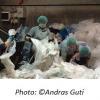News
Displaying Results 151 - 175 of 407
Contrary to what most people think, transport is not the major source of particle pollution in the air. In fact, in Serbia and many other countries, domestic heating is the most important source of harmful particle pollution (PM2.5 and PM 10). In Serbia, pollution is a result of heating, which is…
Black carbon (BC) is an air pollutant with significant impacts on our health and climate. Resulting from incomplete combustion processes, it is part of fine particulate pollution (PM2.5) and estimated to have a warming impact on climate that is 460–1,500 times greater than that of carbon dioxide (…
Decarbonizing transport and mobility remains a critical policy challenge, for which we must seize the recovery from the COVID-19 pandemic as a unique opportunity to accelerate progress. Decarbonization is one example of an issue where transport, health, and environment all meet – an intersection…
Water, health, climate change and disaster risk reduction are interlinked and interdependent. For example, with climate change, floods and droughts increase in both intensity and frequency. Floods can damage water and sanitation infrastructure, disrupt essential public service provision,…
When scientists in the 1960s investigated the causes of the die-back of forests, the so-called ‘Waldsterben’, and acidification of lakes with associated fish loss, they found that air pollution, often emitted thousands of kilometres away, was the culprit. This research formed the basis for the…
Progress in reducing emissions of key air pollutants has been uneven across the UNECE region over the past few decades. To create a level playing field across the region, the Protocol to Abate Acidification, Eutrophication and Ground-level Ozone (Gothenburg Protocol), a unique instrument to…
Air Convention Task Force discusses impacts of COVID-19 lockdowns on air quality in the UNECE region
One year after the first COVID-19 lockdown in many parts of the UNECE region, scientists and experts are studying the effects of lockdown measures on air quality. A study from Germany showed that while levels of nitrogen oxides (NO2) measured at urban stations decreased during the lockdown in…
To reduce transmission of the novel coronavirus, Governments in the UNECE region introduced social distancing and other measures, which have often included restrictions on the freedoms of assembly and of movement. Consequently, there has been an impact on procedural rights of public participation…
Systemic deficiencies with regard to access to information, decision-making or compliance with environmental law can seriously threaten successful implementation of circular and green economy and sustainable development. Taking a case to court to advance a widely shared public interest remains an…
Whilst environmental degradation affects everyone on the planet, it affects the lives of women and men in different ways. Implementing environmental policies with gender considerations in mind can be more effective to understand target groups better, gain greater …
Water scarcity and pollution is increasing worldwide, as a result of the rising economic demands for water, population growth and rapid urbanisation, exacerbated by ecosystem losses and climate change. Water-related risks can negatively affect sustainable…
Directive (EU) 2020/2184 of the European Parliament and of the Council of 16 December 2020 on the quality of water intended for human consumption (recast) was adopted by the European Parliament and the Council of the European Union on 16 December 2020 and entered into force on 12 January 2021. The…
Sound emission inventories are the first step for designing effective clean air policies as they provide information about the main sources and the most acute air pollution problems in a country.
Under the Convention on Long-range Transboundary Air Pollution(Air Convention), UNECE has therefore…
While transboundary rivers, lakes and aquifers, accounting for 60 per cent of global freshwater flows, are of crucial importance for the sustainable development and political stability of riparian States, the financial means for their management, development and protection are insufficient in most…
After months of the COVID-19 crisis challenging healthcare systems and undermining economies, governments worldwide are looking for ways to jump-start the economic recovery. Without factoring in environmental concerns, recovery packages risk…
Effective public access to environmental information is critical for promoting a green and circular economy, increased biosafety and community resilience. The need to further such access using modern digital technologies has been increasingly voiced across countries in the light of the coronavirus…
Knowing where exactly air pollutant emissions are coming from in a given country is important to make viable policy decisions.
As a result of integrated air pollution management strategies developed under the UNECE Convention on Long-range Transboundary Air Pollution (Air Convention…
A vision for transboundary cooperation around the Senegal-Mauritanian Aquifer Basin (SMAB) has been developed by representatives of the States that share this aquifer system, namely The Gambia, Guinea Bissau, Mauritania and Senegal.
This work was carried out in the second meeting of the…
Morocco has requested UNECE to review its environmental performance for a second time. To provide the groundwork for the review, a team of UNECE and international experts will participate in a country hybrid mission from December 2020 to February 2021, first meeting national experts by virtual…
The COVID-19 pandemic has caused wide-ranging effects on human health, security and economic activity, which have significantly impacted industrial safety.
The eleventh meeting of the Conference of the Parties to UNECE’s Convention on the Transboundary Effects of Industrial Accidents (Industrial…
Countries in the pan-European region will continue to benefit from the recommendations of environmental performance reviews (EPRs) beyond 2022, following the adoption of the fourth cycle of EPRs by UNECE’s Committee on Environmental Policy at its 26th session, held on 9 and 10 November.
In…
While the COVID-19 pandemic has highlighted the extent to which water, sanitation and hygiene are key to human health through frequent handwashing, in the UNECE region over 16 million people still lack access to drinking water and more than 31 million are currently living without basic…
To avoid damage to the environment, public health and the economy, adopting targets to reduce emissions and introducing measures to enforce them is essential. Providing a framework to facilitate these measures, UNECE assists countries in Eastern Europe, the Caucasus and Central Asia in…
Policy solutions to abate air pollutant emissions need to be targeted to the main emission sources in a given country. To know where exactly the emissions are coming from is therefore the first step in designing a viable air quality management system. The UNECE Convention on Long-range…
UNECE is supporting Armenia, Azerbaijan, Belarus, Georgia, the Republic of Moldova and Ukraine to further enhance strategic environmental assessment (SEA) and transboundary environmental impact assessment (EIA) to prevent and mitigate damage to the environment and health from economic growth. A…


















